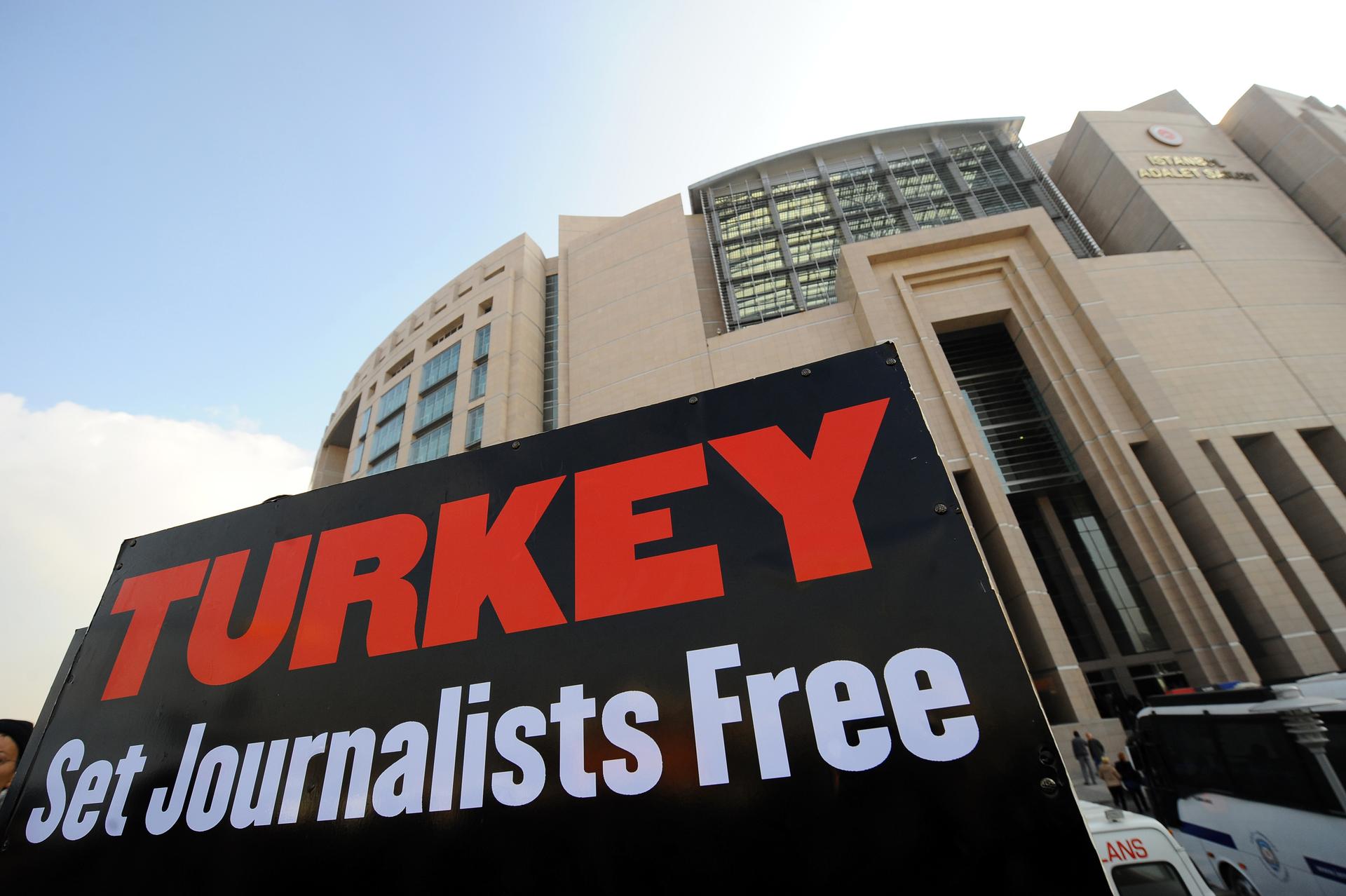Turkey press freedom: a test
A placard is pictured during a protest gathering journalists and human right activists in front of the courthouse in Istanbul during the trial of two prominent Turkish journalists Ahmet Sik and Nedim Sener on Nov. 22, 2011.
ISTANBUL, Turkey — Supporters, observers and family members of journalists accused of being involved in an alleged plot to overthrow the government gathered at a courthouse in Istanbul on Monday for the second hearing of what many consider a test of Turkish press freedom.
Eleven of the 13 defendants are under custody and have been awaiting trial for more than 10 months. One of the accused died of a heart attack before the trial began.
Defendants, in what is known as the OdaTV case, include editors of the hard-line nationalist internet news outlet OdaTV as well as prominent Turkish investigative journalists Ahmet Sik and Nedim Sener. They are being tried for a grab bag of crimes connected to an alleged ultra-nationalist armed terrorist organization called Ergenekon.
The Turkish government has maintained since the beginning of the arrests that the defendants are not being tried for their work as journalists but for their alleged participation in a plot to undermine the government.
More from GlobalPost: Turkey vs. Syria
Nonetheless, the government of Recep Tayyip Erdogan has come under sharp criticism from abroad for the arrests. Turkey ranks 138 out of 178 countries according to Reporters Without Borders. Many of the critical voices were in attendance at the second hearing, where the 130-page indictment against the accused was read aloud in court.
"Anyone expressing criticism of the AKP is being charged within the scope of Ergenekon or some other case and being put in jail," said Binnaz Toprak, a parliamentarian with Turkey's main opposition party in remarks made outside the court house.
The demonstrators gathered outside Istanbul's new Justice Palace, an impressive judicial multiplex, to voice their outrage at what they see as grave violations of freedom of the press. Supporters of the charged journalists carried posters that said "set journalists free" and "end detentions now."
More from GlobalPost: Turkish police arrest dozens, including journalists
"Everyday, the nightmare hanging over press freedom increases in intensity. This pressure has only one meaning. That is to intimidate not just the press but to intimidate and frighten all parts of society and to indiscriminately threaten all opposition," said Emel Soy, head of the Istanbul bureau of the Turkish Journalists Union in a statement.
She ended her remarks by saying "Even if we burn, we will touch," a reference to Sik's comment "who touches it burns" as a way to indicate that some subjects have become taboo to write about and could lead to repercussions.
"Who touches it burns," has become both a warning and a rallying cry for some journalists in Turkey. Previous to his arrest, Sik was working on a book with the working title "Imam's Army" about a powerful movement led by Turkish Muslim preacher Fethullah Gulen. Skeptics accuse the movement of undermining Turkish secularism and eroding separation of powers within the Turkish state.
Police confiscated draft word documents of the book from computers during raids but copies of the text made their way to the internet and were downloaded by many. The draft book was finalized and finally published last month with the signature of 125 writers and journalists.
The name of the published version of the book, "000Book: Who touches burns," is a tribute both to Sik's comment and to the name under which the document for the draft book was stored on his home computer, according to his wife, Yonca.
The Ergenekon trials and the hundreds of arrests had started to irk even some supporters of the cases who thought the trials were a step in the right direction for getting rid of what is known in Turkey as the "deep state."
"Ahmet was extremely hopeful when the investigations into the deep state began. But now as he puts it the real criminals are not being tried for their real crimes," said Yonca pointing out that Sik spent his career looking into violent crimes committed by the deep state.
"That he is being put in the same category is really upsetting," she said.
Meanwhile, Turkish journalists of Kurdish decent are also facing a large court case that threatens press freedom. The investigation by the police into the Union of Kurdistan Communities, or KCK, led to the arrest of more than 30 journalists accused of belonging to the illegal group last week, including a photographer for Agence France Presse.
The KCK is an alleged Kurdish shadow government formed in an attempt to bypass state authority and instead establish a system of taxation, and judiciary independent from the Turkish state. It is also described as the urban wing of the PKK, a militant Kurdish rebel group.
Most of Turkey's more than 90 detained journalists are of Kurdish origin and the latest wave of arrests within the KCK investigation targeted the offices of several Kurdish news agencies. Most are under arrest for belonging or aiding the organization but their full charges will not become clear until an indictment is issued in their case.
"What we are witnessing here is a shame. It is a manipulation of democracy," said Arne Konig, the president of the European Federation of Journalists. "If this continues, Turkey will become a prison for journalists."
The story you just read is accessible and free to all because thousands of listeners and readers contribute to our nonprofit newsroom. We go deep to bring you the human-centered international reporting that you know you can trust. To do this work and to do it well, we rely on the support of our listeners. If you appreciated our coverage this year, if there was a story that made you pause or a song that moved you, would you consider making a gift to sustain our work through 2024 and beyond?
